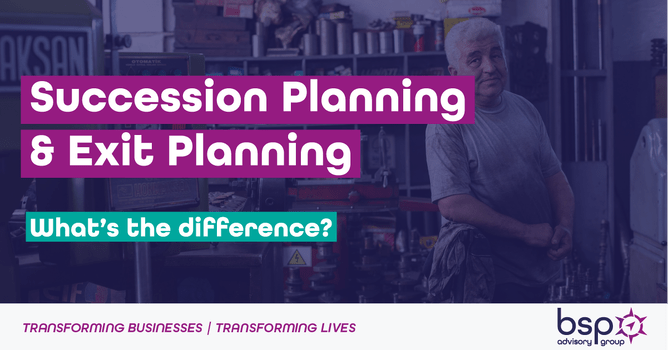Exit planning is the process of planning for the eventual sale or transfer of a business whereas succession planning is the process of identifying and developing internal employees or family members to fill key leadership positions with the aim of taking over the business one day. Issues exist for both topics and expert guidance and advice is recommended.
As a business owner, you know that there are many things to consider when it comes to planning for the future.
Many business owners exit with no plan, no choices and often just a fraction of the wealth they could have attained through better planning of their succession or exit strategy.
Two terms you may have heard are succession planning and exit planning.
While they may sound similar, they are actually quite different. In this article, we will explore the difference between succession planning and exit planning and why each could be important for your business to give you a seamless exit to enjoy your retirement.
What is Succession Planning?
Succession planning is the process of identifying and developing internal employees to fill key leadership positions within a company. The goal of succession planning is to ensure that the organisation can continue to operate smoothly even if key leaders leave unexpectedly. As a business owner this is a critical component of your business.
Quite often the strategy revolves around family members. We have an article called “Managing Succession in a Family Business – Challenges and Success” which is well worth a read as this topic can have its complexities too.
One of the benefits of succession planning is it can help retain top talent by providing employees with opportunities for growth and development within the company. The mere fact that the employees see the business interested in this topic can often be the catalyst to bring forward some likely candidates.
The planning is a long-term process that involves identifying potential successors, assessing their readiness for leadership roles, and providing them with the training and development they need to succeed.
Succession planning should be a regular part of your company’s strategic planning process, and it should involve input from all levels of the organisation.
The benefits of succession planning are clear. By developing a pipeline of talented employees who are ready to step into leadership roles, your company can reduce the risk of disruption caused by unexpected departures.
Interesting interview here about retirement in New Zealand and succession planning
Having a succession plan can also improve employee retention by providing clear career paths and opportunities for growth within the company.
What is Exit Planning?
Exit planning is the process of planning for the eventual sale or transfer of a business. The goal of a business exit planning strategy is to maximise the value of the business and ensure a smooth transition for both the exiting owner, the new owner and the business itself.
Exit planning should be a deliberate and strategic process that starts well before the actual sale or transfer of the business.
Exit planning involves a number of different considerations, including financial planning, tax planning, estate planning, and business valuation. It may also involve identifying potential buyers or successors and developing a plan for transitioning ownership and management of the business.
The benefits of exit planning are also clear. By planning ahead for the eventual sale or transfer of your business, you can maximise its value and ensure a smooth transition for all parties involved.
You can also ensure that your financial and estate planning needs are taken into account and that you are able to achieve your personal and professional goals.
A great business exit also makes for a clear head for your next project or a comfortable retirement if that is the path!
What's the difference?
While both business succession planning and exit planning are important, they serve different purposes.
Succession planning focuses on developing internal talent or family members to fill key leadership positions within the company, while exit planning focuses on preparing for the eventual sale or transfer of the business.
Business succession planning is a long-term process that helps ensure the continuity of the organisation and the retention of top talent.
Exit planning is a strategic process that helps maximise the value of the business and ensure a smooth transition for the owner and the business itself.
In short, succession planning is about developing talent from within, while exit planning is about preparing for a future outside of the business.
As a business owner, it’s important to understand the difference between succession planning and exit planning. While both are important, they serve different purposes and require different approaches.
Succession planning is a long-term process that focuses on developing internal talent to fill key leadership positions within the company. It helps ensure the continuity of the organisation and the retention of top talent.
Business exit planning, on the other hand, is a strategic process that focuses on preparing for the eventual sale or transfer of the business. It helps maximise the value of the business and ensure a smooth transition for the owner and the business itself.
By understanding the difference between these two types of planning, you can develop a comprehensive strategy for the future of your business that takes into account both internal talent development and the eventual sale or transfer of the business.
At BSP we have had great success with our Navigator – Exit and Succession planning services. Click the link for more information.





